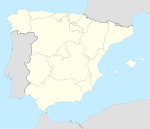Ainzón
| Ainzón municipality | ||
|---|---|---|
 Ainzón - town view
|
||
| coat of arms | Map of Spain | |

|
|
|
| Basic data | ||
| Autonomous Community : | Aragon | |
| Province : | Zaragoza | |
| Comarca : | Campo de Borja | |
| Coordinates | 41 ° 49 ′ N , 1 ° 31 ′ W | |
| Height : | 430 msnm | |
| Area : | 40.46 km² | |
| Residents : | 1,077 (Jan 1, 2019) | |
| Population density : | 26.62 inhabitants / km² | |
| Postal code : | 50570 | |
| Municipality number ( INE ): | 50006 | |
| administration | ||
| Website : | Ainzón | |
Ainzón is a Spanish municipality and a town ( municipio ) with 1,077 inhabitants (at January 1, 2019) in the northwest of the province of Zaragoza in the western autonomous region of Aragon .
Location and climate
The place Ainzón is on the Río Huecha about 65 km (driving distance) northwest of the provincial capital Saragossa near the border with the province Soria at an altitude of about 430 m . The small town of Borja is about 4 km north. The climate is temperate to warm; Rain (approx. 435 mm / year) falls over the year.
Population development
| year | 1857 | 1900 | 1950 | 2000 | 2017 |
| Residents | 1,565 | 2,064 | 1,851 | 1,228 | 1,095 |
The mechanization of agriculture , the abandonment of small farms and the associated loss of jobs led to a noticeable decline in population ( rural exodus ) in the second half of the 20th century .
economy
For centuries, the residents of the place lived directly or indirectly as self-sufficiency from agriculture. Viticulture played a major economic role in the 19th century until the outbreak of the phylloxera crisis . Today, almond tree plantations and the wines of the area ( Denominación de Origen Campo de Borja) again contribute to the economic strength of the place.
history
Celtic, Roman, Visigoth and even Arabic-Moorish traces of settlement have not yet been discovered, although the place name could have an Arabic-Latin origin ( aïn = "source", zon = "area"). Ainzón is mentioned for the first time in 1121 and belonged to the Crown of Aragón. Since the year 1453, the place was in the control of the Cistercian monastery of Santa María de Veruela , located almost 20 km to the west .
Attractions
- The former castle (castillo) was in the middle of the village.
- The parish church of Nuestra Señora de la Piedad has medieval origins, but it and even the Romanesque -style bell tower (campanar) were completely renovated in the 17th and 18th centuries. The interior contains some important furnishings - including the main altar (retablo) made in the Churrigueresque style with a protective cloak Madonna , an elongated crucifix from the 13th century and a curved statue of the Virgin Mary from the same period; a hemispherical font is also preserved.
- Some houses in the village date back to the 16th century.
- There are several rock cellars ( bodegas ) in the outskirts .
Web links
- Ainzón, tourism site - photo + info (Spanish)
Individual evidence
- ↑ Cifras oficiales de población resultantes de la revisión del Padrón municipal a 1 de enero . Population statistics from the Instituto Nacional de Estadística (population update).
- ↑ Ainzón - climate tables
- ^ Ainzón - population development
- ↑ Ainzón - Castillo
- ↑ Ainzón - Church

